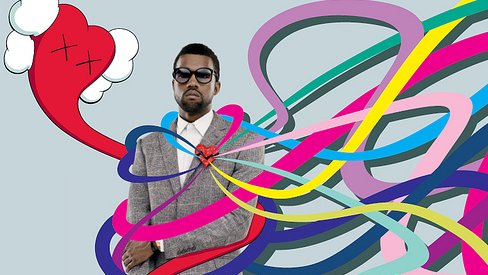
Okay, okay. I am aware that there are other musicians aside from Kanye West, and I promise that this will be the last Kanye/Kid Cudi-related “Pop Psychology” entry for a while. That said, I think the most recent single from 808s and Heartbreaks tackles a very important issue. In a polarizing (and perhaps seizure-inducing) video, Kanye explains how all of his success has come at the expense of any meaningful familial connections. More specifically, he expresses his disappointment in not having kids of his own. In the opening lines, Kanye sings, or I guess Autotunes:
My friend showed me pictures of his kids
And all I could show him was pictures of my cribs
He said his daughter got a brand new report card
And all I got was a brand new sports car.
It’s a poignant and sincere song from a performer more commonly known for his bling than his blatant honesty. Kanye acknowledges that despite the fact that he has, or could have, any material good he would ever want, he is missing out on the deeper happiness that comes with family. Yet, while Kanye’s words seem intuitively accurate, a recent article in The Psychologist points to a different conclusion—namely, that having children actually has no effect on happiness. The author, Nattavudh Powdthavee, discusses how “over the past few decades, social scientists like me have found consistent evidence that there is an almost zero association between having children and happiness.”
In fact, the article outlines some recent research illustrating how children have shown to have a negative effect on multiple measures of personal joy. Having children has been associated with decreased reports of happiness, marital contentment, life satisfaction and even mental well-being. Robin Simon, a sociologist at Florida State University, has gone so far as to argue that parents are more likely to become depressed. The research shows that Kanye West is being a little too hard on himself; the bachelor’s life may also be the good life.
The question then becomes that if having kids actually makes us more miserable, why do so many people have them in the first place? Or more importantly, why do so many people think that having kids will make them happier? One popular explanation, championed by Harvard’s Dan Gilbert (whose work I have previously discussed here), concerns the concept of “memes.” Memes are simply ideas or values that try to replicate much like genes would. A successful meme is an idea that, regardless of whether it is true or not, can spread through a culture or community.
In this case, the notion that “kids bring happiness,” is what Gilbert calls a “super-replicator,” because anyone who believes in such a concept will surely pass it on to their own offspring. On the other hand, those people who think that “kids make our lives miserable” are unlikely to pass on such an idea because, well, there is no one to pass it on to. As a result, the belief that children enrich our lives has been continually selected throughout thousands of years of human evolution, leading to a society today that widely believes in the tenet that having offspring will bring joy.
Personally, I take issue with the conclusions provided by these studies. I think that there are really two very different forms of happiness, and much of this research is only getting at one of them. There is a moment-to-moment type of happiness that assesses how you feel at any one point in time, but there also exists a broader sense of happiness that is based more on a sense of pride and gratification than actual pleasure, a sentiment that is difficult to capture in a short survey. I think a lot of this research is really only assessing the former type of happiness, not the latter. Admittedly, many aspects of parenting are extremely annoying. Changing diapers is disgusting. Attending weekend soccer games is boring. And teaching a teenager to drive is downright terrifying. It’s no exaggeration to say that there are plenty of instances when having kids can seem more like a chore than a blessing.
However, children can also bring a sense of personal fulfillment that outlasts such short-lived moments of unhappiness. During a hilarious interview on The Colbert Report (in a wonderful but rare moment where Colbert gets incredibly introspective), Gilbert likens children to the light in our refrigerators: “Every time you look at your refrigerator light, it’s on. Every time you think about your kids, you’re happy.”
I think that kids bring an enduring happiness that may get overlooked when people have to assess how they feel at that exact moment. I just recently watched Hoop Dreams (go Full Frame!), and I am reminded of a scene where one of the two protagonists, William, describes what it was like to have his first child.
“I was in the delivery room, and the nurses came to me, and she handed the baby to me. I’ll never forget how hard she was squeezing my hand.”
Surely, this kid is going to bring William a lot of hardship, but I seriously doubt he will ever regret having the child. And, despite what the current psychological research may say, I think Kanye West is right in being jealous of what William and so many of his own friends have. I suspect that that Kanye will continue to have a lot of coldest winters until he has an actually baby to call “baby.”
Get The Chronicle straight to your inbox
Signup for our weekly newsletter. Cancel at any time.
